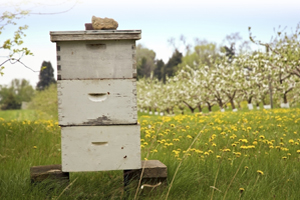
28 Feb Pollinator protection featured at upcoming environmental conference, March 30-31 at Yale
The impact of pesticides on declining bee health will be a central theme of Healthy Communities: Green solutions for safe environments, the 30th National Pesticide Forum, March 30-31 at Yale University in New Haven, CT. Join researchers, authors, beekeepers, organic business leaders, elected officials, activists, and others to discuss the latest science, policy solutions, and grassroots action.
Featured Bee Speakers
Christian Krupke, PhD is a professor of entomology at Purdue University. His recent research examines the impacts of neonicotinoid pesticides applied on corn to honey bees. The results demonstrate that bees are exposed to neonicotinoids and several other agricultural pesticides in several ways throughout the foraging period, including exposure through dust, soil corn pollen, and through dandelions growing in contaminated soil. Dr. Krupke is also the chairman of a group of university researchers that sent a letter to EPA stating that biotechnology companies are keeping university scientists from fully researching the effectiveness and environmental impact of genetically engineered crops.
David Hackenberg is the beekeeper who first discovered the disappearance of honeybees known as Colony Collapse Disorder (CCD). Mr. Hackenberg believes that pesticides contribute to CCD and that honeybees are a barometer of the environment. He is featured in the film Vanishing of the Bees and various media reports, including this 60 Minutes segment. Mr. Hackenberg founded Hackenberg Apiaries in 1962 as a high school vo-ag project. Today, he and his son operate approximately 3,000 hives of bees in 5 states for pollination and honey. David is a past president of the American Beekeeping Federation, and currently serves as co-chair of the National Honey Bee Advisory Board.
Robert Deschak is a core member of the NYC Beekeepers Association, a group of beekeepers, bee enthusiasts, and honey lovers who live, work and pollinate in New York City. NYCBA was central to overturning the policy that had banned beekeeping in the city. Mr. Deschak is a Core Member of the group and helps run the monthly meetings, organizes special events, and has his own hives atop a convent in the Bronx. He has helped move live hives off of rooftops, captured urban swarms, and proven himself in the urban beekeeping realm. Robert is a Columbia graduate who is also a former Marine officer, and as of late has been working for the Department of Education.
Ted and Becky Jones are the president and treasurer of the CT Beekeepers Association, a group formed to increase public awareness of the importance of honey bees for Connecticut agricultural crops and the environment. They promote and support all beekeepers and their local organizations by providing a common forum for the beekeepers of Connecticut to come together to share information and ideas. The Connecticut Beekeepers Association was founded in 1891.
Other speaker highlights include: Sandra Steingraber, PhD, ecologist and author of several books including Living Downstream; Gary Hirshberg, chairman and co-founder of Stonyfield Farms; Julia Brody, PhD, executive director of the Silent Spring Institute; John Wargo, PhD, author and Yale School of Forestry & Environmental Studies professor; Curt Spalding, Administrator for EPA’s New England Region; and more. See full speaker list and schedule of events.
Registration
Register online. Fees start at $35 ($15 for students) and include all sessions, conference materials, and organic food and drink.
Organizers
The conference is convened by Beyond Pesticides, Environment and Human Health, Inc., and the Watershed Partnership, Inc., and co-sponsored by Audubon Connecticut, CATA (Farmworker Support Committee), Citizens Campaign for the Environment, Common Ground, Connecticut Northeast Organic Farming Association (NOFA), Ecological Health Association, Inc., Grassroots Environmental Education, Green Decade/Newton, GreenCape, Hartford Food System, LEAH Collective, NOFA Massachusetts Chapter, Northern New Jersey Safe Yards Alliance, Rivers Alliance of Connecticut, Safelawns.org, Sierra Club-Connecticut Chapter, Toxics Action Center, and Yale Student Environmental Coalition.
Please share this information online, in newsletters, or by email with your contacts who might be interested in attending. Thank you.

